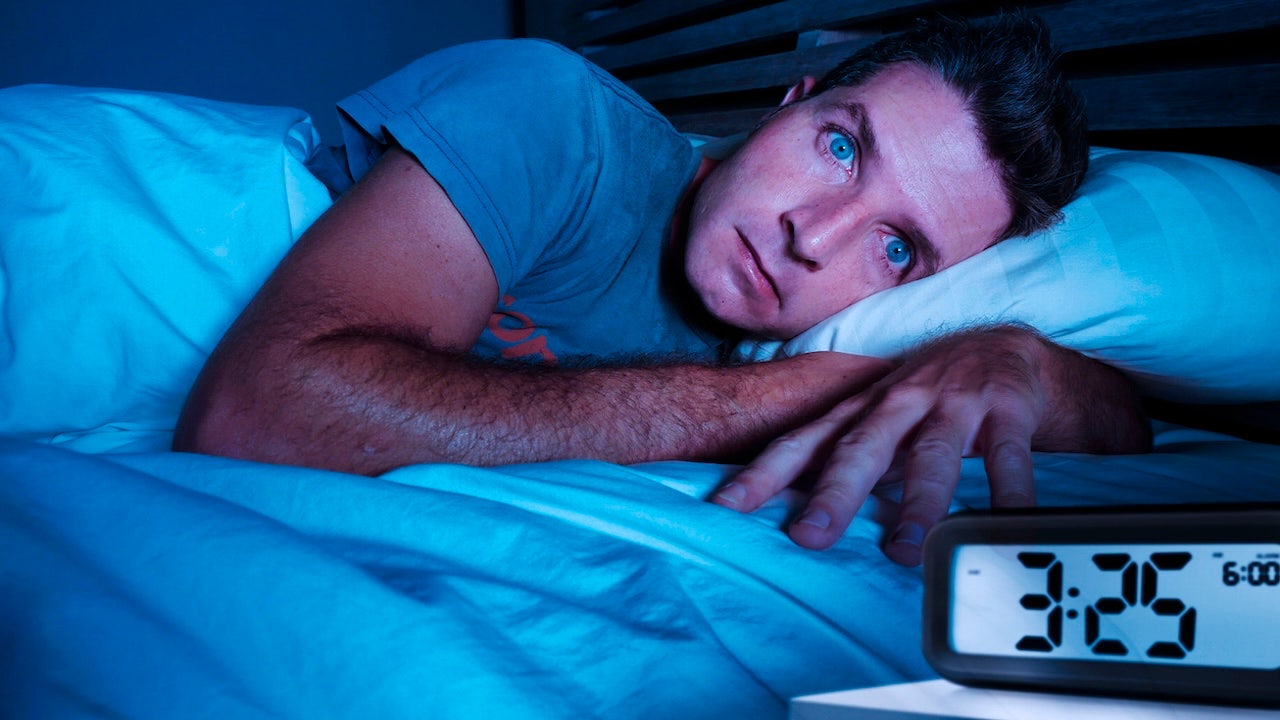Anyone who has ever woken up in the middle of the night and struggled to go back to sleep knows the toll insomnia can take the following day.
More than 17% of adults had trouble staying asleep most days or every day of the past month, according to 2020 data from the Centers for Disease Control and Prevention (CDC).
Dr. Biquan Luo, a San Francisco sleep expert and CEO of LumosTech, which produces a smart sleep mask to promote healthy circadian rhythms, shared some of the reasons and remedies for waking up at night.
DO WEIGHTED BLANKETS REALLY DELIVER A SLEEP FIX? HERE’S WHAT YOU NEED TO KNOW
There are various reasons that people wake up at night, Luo said.
Some of the common sources of sleep disruption include stress and anxiety, discomfort or pain, and environmental disruptions such as noise, movement or too-hot or too-cold temperatures.
More than 17% of adults had trouble staying asleep most days or every day of the past month, according to 2020 CDC data. (iStock)
Sleep disorders, such as sleep apnea or restless leg syndrome, can also cause people to wake up during the night.
“Disruption of the body’s natural sleep-wake cycle” can also lead to fragmented sleep, said Luo.
What to do when you wake up
When you wake up in the middle of the night, it’s best to stay in bed at first, try to relax and see if you can fall asleep again, said Luo.
FOR QUALITY SLEEP, TIMING IS EVERYTHING, EXPERTS SAY: HERE’S THE SECRET OF SUCCESSFUL SLUMBER
She suggested trying such techniques as progressive relaxation, breathing exercises, white noise machines and other methods that may help you relax.
“If you can’t fall back asleep after 10 or 15 minutes, it’s time to get out of bed,” said Luo.

When you wake up in the middle of the night, it’s best to stay in bed at first, try to relax and try to go back to sleep, said a sleep expert. (iStock)
“Try going to a quiet and comfortable place at home, like the couch, and engage in a quiet, low-stimulation activity, such as reading a book or doing a calming activity, until you feel sleepy again — then return to bed.”
Mistakes to avoid
Resist the urge to reach for your phone or look at the clock if your sleep is interrupted, said Luo.
Checking the time upon waking up in the middle of the night is one of the most commonly made mistakes that will make it more difficult to drift back off, said Luo.
SLEEP EASY: 6 WAYS TO ADJUST YOUR BEDROOM SO YOU GET A GOOD NIGHT’S REST
“Checking the time can increase stress and make it harder to sleep,” she noted.
“Additionally, if you check the time on your phone, the contents of the phone may be too stimulating, which further prevents you from relaxing and falling asleep.”
What to know about your internal clock
Waking up in the middle of the night can be a result of your body’s internal clock not lining up with your sleep schedule, said Luo.

Timed exposure to bright light can help adjust your circadian rhythm. (iStock)
“Our sleep is governed by two key factors — early in the night, it’s the buildup of sleep pressure, our body’s need for rest, that helps us both fall and stay asleep,” the expert said.
CLICK HERE TO SIGN UP FOR OUR HEALTH NEWSLETTER
“Later in the night, our internal clock, known as circadian signaling, plays a crucial role in maintaining sleep.”
In an ideal scenario, these two factors will work together to keep you asleep, Luo said.

“Try going to a quiet and comfortable place at home, like the couch, and engage in a quiet, low-stimulation activity, such as reading a book or doing a calming activity, until you feel sleepy again, then return to bed.” (iStock)
“But if sleep pressure fades before the circadian signal fully kicks in, it might lead to waking up at night,” she said.
“If you’re unsure why you’re waking up during the night, you may look into adjusting your internal clock to see if it helps reduce these interruptions.”
CLICK HERE TO GET THE FOX NEWS APP
Some ways to adjust your circadian rhythm include waking up at the same time each day, using timed exposure to bright light, changing meal times, taking melatonin supplements, exercising at different times of day and consuming moderate amounts of caffeine in the morning, according to the Sleep Foundation.
For more Health articles, visit www.foxnews.com/health.





